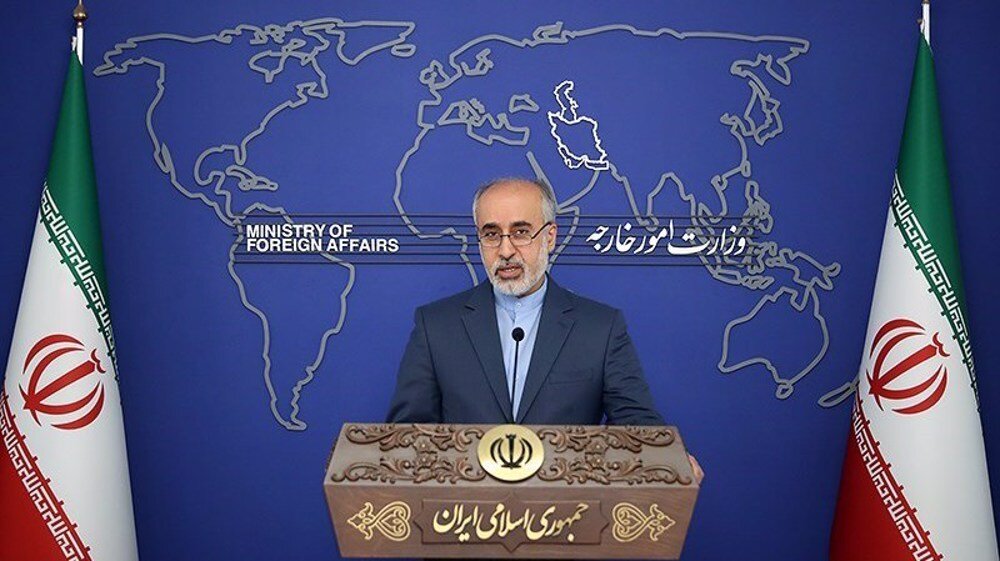OIC will face ‘litmus test’ over U.S. backing for Israel aggressive war crimes: Iran

TEHRAN- The spokesman for Iran's Foreign Ministry has emphasized the significance of the Organization of Islamic Cooperation's (OIC) impending emergency meeting, stating that the 57-member group is "facing a test" over Israel's genocide in the Gaza Strip.
One day prior to an unusual meeting of the OIC Council of Foreign Ministers on the Gaza war in the Saudi city of Jeddah, Nasser Kanaani made the comments at a weekly news briefing on Monday. Saudi Arabia has hosted two meetings of this kind; the first was held there the previous year.
“This cruel war continues in the shadow of warmongering by the Zionist regime’s officials and the unlimited support of the United States. The OIC is facing a test tomorrow to show how much of its capacity it will use in support of Palestine,” he said.
“The leaders of Muslim countries are expected to take a strong and unanimous decision that requires an effective step to defend Palestine, with an urgency of stopping the war.”
"GCC unable to comment on islands in Persian Gulf”
Kanaani also addressed a statement against Iran that the Persian Gulf Cooperation Council's (GCC) Ministerial Council released following its meeting in Riyadh, Saudi Arabia.
The communiqué restated the United Arab Emirates' claim to the three islands in the Persian Gulf: Abu Musa, the Greater and Lesser Tunbs.
Iran has consistently stressed its sovereignty over the islands based on international law, according to the senior diplomat.
He went on to add, “The GCC is not in a position to comment on this matter. Issuing unilateral statements negates the positive atmosphere in relations between Iran and the countries in this region. Iran expects its neighbors to adopt a realistic approach and avoid false comments.”
There are innumerable historical, legal, and geographical records in Iran and other countries that attest to the historical status of the three Persian Gulf islands—Abu Musa, the Greater and Lesser Tunbs— as belonging to Iran. Nonetheless, the islands have been consistently claimed by the United Arab Emirates.
The islands were ruled by the British until November 30, 1971, when Iran regained authority over them two days before the United Arab Emirates was set to become an official state, and one day after the British withdrew their troops from the region.
GCC unilateral statement on Arash gas field is rejected by Iran
The GCC Ministerial Council also mentioned the Persian Gulf Arash natural gas field, which Iran shares with Saudi Arabia and Kuwait, in its statement. It claimed that the two Arab nations alone are entitled to the field's natural resource extraction.
Iran has frequently stated, according to Kanaani, that it is taking a principled stance on the issue that is grounded in international law.
“Making one-sided claims will not create any rights for the claimant. We have emphasized the continuation of technical and legal negotiations with the Kuwaiti authorities,” he added.
“Raising such issues in unilateral statements is not acceptable at all.”
Intl. community responsible for provocations by Israel in Lebanon
The official stated that the Israeli regime is attempting to incite tension and disperse unease in the region because of its terrorist nature in relation to Israel's ground invasion of southern Lebanon and the potential for tensions to escalate.
“Any action taken by Israel against other parties is an action aimed at jeopardizing regional peace and security.”
According to Kanaani, responsibility rests with the regime in Tel Aviv and the nations that back it, especially the U.S., which has given the usurping regime its full backing.
He stated that "provocative actions" against Lebanon are solely the responsibility of the international community.
U.S. stance on Tehran-Moscow space cooperation ‘despicable’
Kanaani responded to a question concerning the U.S. criticism of the Iranian Pars-1 satellite launch from a Russian spaceport by saying that no one is permitted to cast doubt on Iran and Russia’s peaceful cooperation.
“The defense and space cooperation between Iran and the Russian Federation is conventional and in accordance with international law,” the official said, dismissing U.S. worries.
After Iran launched a domestic satellite with a Russian carrier, the U.S. objected to Tehran and Moscow working together on space projects. However, the Iranian Foreign Ministry spokeswoman dismissed these concerns.
“Iran has extensive cooperation with Russia. It is the right of countries to cooperate within the framework of international relations,” he stated.
Dismissing the U.S.’s “baseless” accusations, Kanaani stated that the U.S.’s accusations against Iran-Russia collaboration and its remarks regarding regional issues like the war in Ukraine are motivated by “political motives.”
“Iran will maintain cooperation with friendly countries within the framework of its rights,” the spokesman stressed.
Leave a Comment